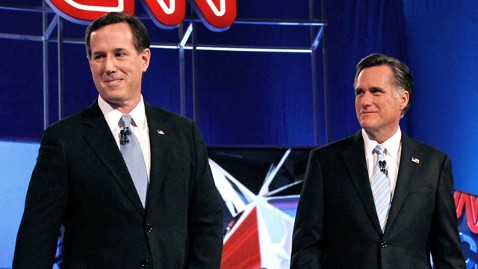Romney Campaign Says Their Opponents Would Need An 'Act Of God' To Win GOP Nomination

(Image Credit: Ross D. Franklin/AP Photo)
ABC News' Michael Falcone and Emily Friedman:
BOSTON - On the day after his wins in six states on Super Tuesday, senior officials from Mitt Romney's campaign expressed confidence that the Republican nomination was all but theirs.
However, they stopped short of tracing a detailed path from Romney's current position in the race for delegates to the point at which he could officially vanquish his rivals and clinch the nomination.
"The nomination is an impossibility for Rick Santorum or Newt Gingrich," a Romney campaign strategist told reporters who gathered at the campaign's headquarters in Boston on Wednesday.
Romney, who has accumulated more than double the number of delegates as his closest competitor, Rick Santorum, will need to win 48 percent of the delegates in the remaining primary and caucus states to be the nominee, the official said.
"We've won 53 percent of them so far. For Rick Santorum to get to the nomination he'd have to win 65 percent of the remaining delegates and he's only won 22 percent of them so far Newt Gingrich to win the nomination would have to get 70 percent of the remaining delegates and he's only won 13 percent so far."
Romney, who appears to have won an important victory in Ohio as well as in Alaska, Idaho, Massachusetts, Vermont and Virginia, picked up more than 200 additional delegates on Tuesday. By comparison Santorum and Newt Gingrich were both on track to claim less than half that total. Ron Paul remains far behind in the delegate race.
"As you can tell all we have to do is keep doing what we're doing and we can get to the nomination," the Romney official said, "For those guys it's going to take some sort of act of God to get to where they need to be on the nomination front."
And in a memo circulated by the campaign on Wednesday, members of Romney's team declared their opponents' bids dead.
The memo titled, "Our Opponents' Last Stand: A Postmortem," noted that the former Massachusetts governor has won "more than 50% of all delegates awarded and now holds nearly 40% of the 1,144 delegates needed to win the nomination."
Even so, campaign officials acknowledged that their path to that goal was going to be long and grueling.
"The rules that the RNC has set up has made this become a much longer process and we're expecting that," Romney strategist Russ Schriefer said. "Proportional delegates mean that the process is going to be dragged on for a long period of time."
Though there are 11 more nominating contests in March, Schriefer pointed to just two that appear to be bright spots for the campaign: Hawaii, which holds its caucuses next Tuesday, and Illinois, which has a primary on Mar. 20.
"I think certainly looking to Hawaii, looking to Illinois. I think that both of those states can be very important for us," he said. "I think if you look even a little bit later into April, you look into Maryland, DC - 19 delegates in DC."
Schriefer avoided characterizing Romney's odds in states like Alabama and Mississippi, which hold primaries on Mar. 13 and where Santorum could score victories.
Romney advisers also pointed out that none of the coming state contests will award a large enough number of delegates to help any of Romney's GOP counterparts achieve the nomination.
"There are no more opportunities on this calendar for big delegate pick-ups," a senior adviser told reporters at the briefing.
They sought to portray Santorum's deficit as "insurmountable," noting that he faces an "Ohio problem" in other states, referring to the former Pennsylvania's senator's inability to compete for delegates in some districts due to his campaign's lack of organization. Santorum, for example, will not be on the ballot in four of Illinois' 18 congressional districts when voters go to the polls there later this month.
But, by the same token, those states will not be enough to put Romney over the top any time soon either.
"This is going to go on for a while," Schriefer said.